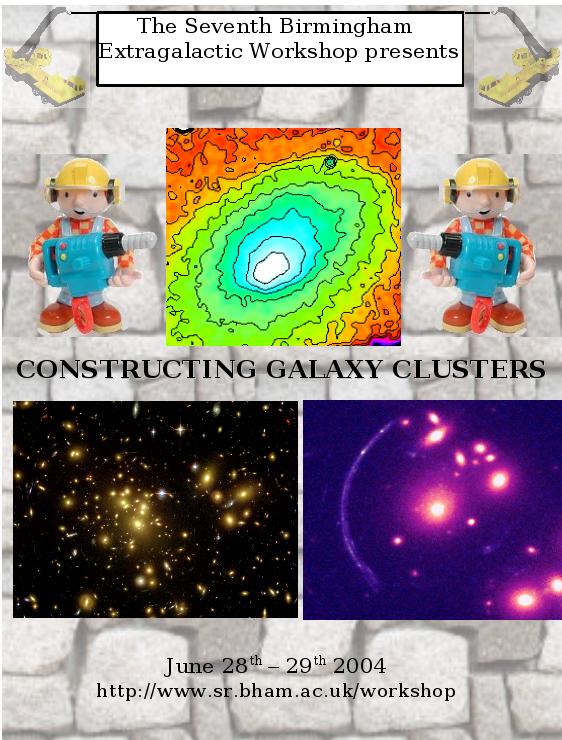

News
June 22nd 2004
Finalized programme postedJune 2nd 2004
Final announcement sent outJune 2nd 2004
Programme and list of registrants postedMay 25th 2004
Second announcement sent outMay 5th 2004
First announcement sent out
Scientific Background
The hierarchical picture of cluster assembly, with mass and galaxy infall along filaments and via mergers, is certainly an attractive model, but how much hard evidence exists to support it? What are the effects of cluster growth through accretion and mergers on the galaxy population and the intergalactic gas? When and how were cluster ellipticals assembled? These are questions we wish to address in this year's Birmingham workshop.
Current cluster observations reach all the way from evidence for proto-clusters at very high redshifts, through recently discovered clusters at z~1, to detailed studies of clusters in the nearby Universe. Linking the observed properties of these systems should in principle give us a clear picture of cluster assembly, but we are still missing crucial information. Future wide-field surveys (eg NIR, SZ) will help to fill the gaps.
The aim of this workshop is to bring together observations, theory and simulations covering a broad range of overdensity and redshift, to address the topic of cluster assembly, and its effects on the structure and contents of clusters. The Birmingham Extragalactic Workshops typically involve ~50 participants, and are held in the School of Physics & Astronomy at Birmingham University. The format will be similar to previous workshops in the series, with a mixture of 15 and 30 minute talks, leaving plenty of time for discussion.
Organising committee
Logistics
Travel to Birmingham: It is very convenient to travel to the University by train. Birmingham University has its own station called "University", which is an 8 min ride from Birmingham New Street station, with local trains from New Street running every 10-15 mins during most of the day.
From the University station walk towards the centre of the campus, aim in the general direction of the clock tower, which is in Chancellors Court. The meeting will be held in the West Lecture Theatre in the Physics West Building (note that this is different from previous years' meetings). Physics West is on the other side of Chancellor's Court from the station. Enter the building through the door facing the clock tower; signs will be there to guide you to the lecture theatre.
Some car parking spaces will also be available, please let us know if you plan to travel by car.
General directions to getting to the University can be found here
Maps of the campus and surrounding area are shown on the University webpage.
Overnight Arrangements: Rooms have been reserved for the night of June 28th in a student hall of residence, at a cost of £25 + VAT for B&B. These will be allocated to attendees on a first come, first served basis. For those who prefer to make their own arrangements, a list of local hotels and guest houses is available here. Most of these hotels are within walking distance of the University. The last two listed are in the city centre and are thus a train ride away.
Registration: Registration will take place on the morning of June 28th. The basic workshop fee will be £38 per participant. This will cover two lunches, plus the customary Balti at a local restaurant on the Wednesday evening. Payment can be made by cash or cheque (but unfortunately not credit card) on arrival.
If you wish to attend, please click here, paste the form into your mail client, and mail to workshop@star.sr.bham.ac.uk.
Projection Facilities: We will have the usual overhead projector and facilities for projecting Powerpoint presentations. As ever with Powerpoint you probably should have a back-up in the event of an incompatibility between our system and yours.
This page is maintained by David Henley and was last updated on